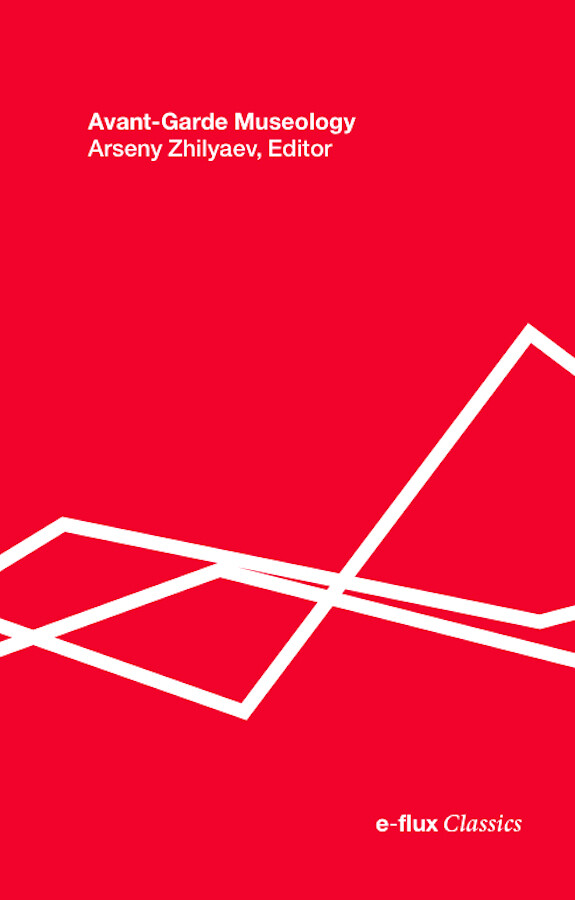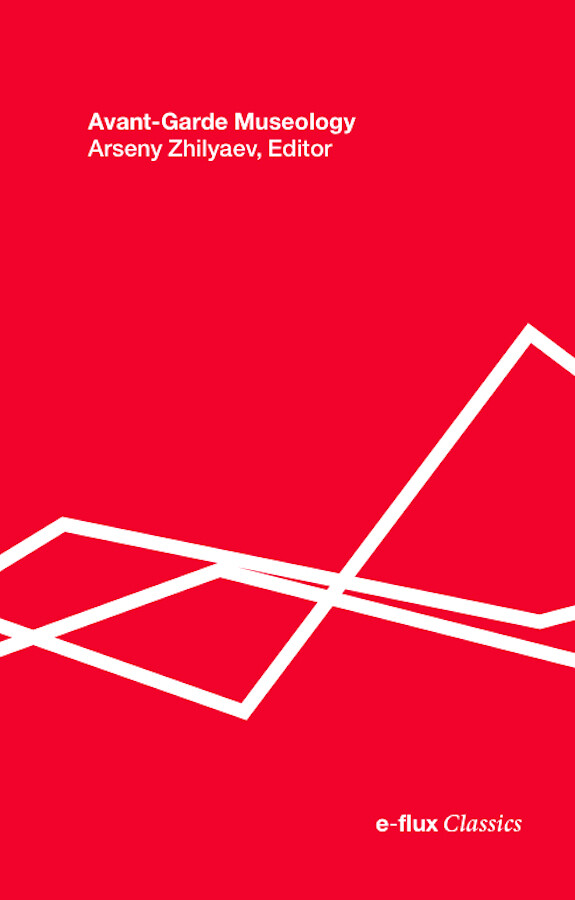Avant-Garde Museology
Arseny Zhilyaev
Avant-Garde Museology is the first title in e-flux classics, a new book series focusing on an emerging historical canon specific to an era when the world’s many eccentric modernities, economies of knowledge, and shared political histories seek to be recognized through contemporary art.
The museum of contemporary art might very well be the most advanced recording device ever invented in the history of humankind. It is a place for the storage of historical grievances and the memory of forgotten artistic experiments, social projects, or errant futures. But in late nineteenth and early twentieth-century Russia, this recording device was undertaken by a number of artists and thinkers as a site for experimentation.
Arseny Zhilyaev’s Avant-Garde Museology presents a collection of crucial essays documenting the wildly encompassing progressivism of this period, by figures such as Nikolai Fedorov, Aleksandr Rodchenko, Kazimir Malevich, Alexander Bogdanov, Andrey Platonov and many others—several of which are translated from the Russian for the first time.
While the first question for any progressive curatorial practice and museology concerns how the errant futures stored in the museum can be played back, for the authors in this compendium, the more urgent question becomes: How might the contents of the museum be reanimated so as to transcend even the social and physical limits imposed on humankind?
—Edited by Arseny Zhilyaev; Series editors: Julieta Aranda, Brian Kuan Wood, Anton Vidokle
With texts by David Arkin; Vladimir Bekhterev; Aleksander Bogdanov; Osip Brik; Vasily Chekrygin; Leonid Chetyrkin; Nikolai Druzhinin; Nikolai Fedorov; Pavel Florensky; R. N. Frumkina; M. S. Ilkovskiy; V. I. Karmilov; V. Karpov; Valentin Kholtsov; P. N. Khrapov; Yuriy Kogan; Natalya Kovalenskaya; Nadezhda Krupskaya; S. P. Lebedyansky; A. F. Levitsky; Vera Leykina (Leykina-Svirskaya); Ivan Luppol; Kazimir Malevich; Andrey Platonov; Nikolai Punin; Aleksandr Rodchenko; Yuriy Samarin; I. F. Sheremet; Andrey Shestakov; N. A. Schneerson; Ivan Skulenko; M. Vorobiev; N. Vorontsovsky; Boris Zavadovsky; I. M. Zykov.
Reviews
“Avant-Garde Museology”, Art Review Asia • Hanlu Zhang
Avant-Garde Museology is the first book in a new series called “e-flux Classics,” which, according to the editor, aims to question the existing art historical canon by revisiting and complicating it. This bulky publication carries that mantle as a recuperating study in English-language academia of Communist Russia led by several members of the…
Avant-Garde Museology is the first book in a new series called “e-flux Classics,” which, according to the editor, aims to question the existing art historical canon by revisiting and complicating it. This bulky publication carries that mantle as a recuperating study in English-language academia of Communist Russia led by several members of the e-flux community.
Edited by Arseny Zhilyaev, Avant-Garde Museology is a collection of texts ranging from philosophical and artist writings to conference documents and governmental reports. Together they summon the landscape of Soviet revolutionary museology, illuminating a short yet extremely idea-dense period between the Russian Revolution and the Second World War. It is surprising to learn that in the space of just a couple of decades so many discussions were addressing the role the museum should play in both a citizen’s daily life and in a violently transforming society. In classic Euro-American art history, this period is often epitomized thinly by Tatlin’s Tower and Malevich’s squares. By comparison, the art scene of the Weimar Republic, which developed over roughly the same period, has been the subject of countless anthologies, conferences, and exhibitions.
There is a great diversity of voices on the place of art in contemporary life and politics. Malevich appears with a manifesto like piece stating his museological view that museums not solely exhibiting contemporary life are “the former debauched houses of Rubens and the Greeks.” Art critic and historian Natalya Kovalenskaya, in a text titled “An Experiment in Marxist Exhibition-making at the State Tretyakov Gallery,” has a slightly different opinion: “We had to juxtapose the art of the ruling classes with the art of the oppressed. It is only possible to fully understand the ideological character of art of the landowners when the entire system of exploitation that produced it is exposed.” Other interesting moments in the book include those indicating the change in ideological tone after Stalin came to power, differentiations between the perspectives of amateurs (often workers) and museum professionals, and the mesmerizing symbiosis and interactions of the mysticism Cosmism, Marxist doctrines, and real social conditions.
In a 630-page book about historical museums and exhibitions, we would expect to see more illustrations and visual documents that just 16 small black-and-white plates. This makes one wonder about the nature and intention of the project. For me, it is less a collection of primary art historical resources than a mixture of literary anthology and theoretical reference for current museum practice. It is not difficult to find in the book the prototypes of some of the newest tendencies in recent museological and curatorial development, such as the museum-in-transit, the dematerialization of the exhibition, the increasing display of the bigger cultural environment (supplemental materials) and so forth. The astonishing insight and foresight expressed by writers some eighty years ago are truly “avant-garde.”
But do not forget, these views are expressed in the omnipresent discourse of a unilateral ideology that advocates a closed end in art. Another e-flux writer, Hito Steyerl, in her recently published essay “A Tank on a Pedestal: Museums in an Age of Planetary Civil War,” argues that museums of all kinds “have less to do with the past than with the future.” A crucial purpose of museological preservation work is to prevent history from repeating itself. Some of the revolutionaries whose texts are included here may disagree, but this book, with its abundant visionary remarks, seems to have aims similar to the preservation work Steyerl refers to.
“Avant-Garde Museology”, Leonardo Reviews • Amanda Egbe
Avant-Garde Museology is an anthology of documents, prose, fragments, and experiments from the period of post revolutionary Soviet Union museum practice that until now have been dispersed and unavailable in English. The translated collection draws together ideas that share, as editor Arseny Zhilyaev suggests, a common theme that is the…
Avant-Garde Museology is an anthology of documents, prose, fragments, and experiments from the period of post revolutionary Soviet Union museum practice that until now have been dispersed and unavailable in English. The translated collection draws together ideas that share, as editor Arseny Zhilyaev suggests, a common theme that is the project to reconstitute the museum as an institution of hope as opposed to the old order that ordained its own ideals and objects to the cost of the majority. The unfinished project heralded in this collection–which with the advent of Stalinism reversed what achievements had been made–is an approach to the museum that is active and alive, alongside the undertaking to rebuild a fairer society.
The anthology aimed at art historians, archivists, and cultural theorists brings together a lightly curated selection of documents and projects. It represents a missing compendium to the movements that are recognisable as the outputs of the Russian revolution, such as constructivism and social realism, and to the dominating narrative of the museum as a Western modernist enterprise. The book is divided into six sections–Museum as Common Task, The Museum of Avant-Gardism, The Materialistic Museum, The Museum Outside of the Museum, Museum of the History of the Revolution and The Atheists’ Museum—expounding various principles and concepts that were being developed towards the notion of avant-garde museology that Zhilyaev postulates as the framing device for this collection. The anthology as a whole, as Zhilyaev acknowledges in his introduction, is not an academic text as such nor is it a rigorous analysis of the project proposed in the title of the book. Rather, it is an attempt to open up for the reader the field of museum studies alongside art history to an invaluable moment in our cultural, aesthetic, and historical heritage that has not been so readily available.
The first section of the book spends much time with the work of Nikolai Fedorov whose ideas resonate throughout the book’s entirety, as well as in part with Zhilyaev’s notion of avant-garde museology. The religious philosopher Fedorov was one of the major contributors to Russian cosmism, the movement that saw the fusion of science, nature, religion, and technology promoting the evolution of human beings beyond the earth and into the cosmos. For Fedorov the museum becomes a site from which humanity can transcend both physical and social limitations. The museum must collect everything that is produced. The current model of the museum is not unified; it is full of discord and disunity and hence mirrors humanity. There must be a movement both in society and in the museum towards brotherhood. This is achieved through the building of museums as churches where investigation into the human condition is essential; the scholars of the museum are its congregation that seek answers through its commission, a place to resolve humanities discord.
Another example that resounds with the organizing theme of the book is an excerpt from Platanov’s novel Chevengur, “The Revolution Memorial Reservation.” A satire on the years following the uprising, the “memorial reservation” holds on to all that was good from the revolution, concepts of brotherhood and egality that were the lifeblood of revolutionary action. The newly conceived post-revolutionary town has none of this energy, creativity, and fraternity; rather, the banalities and bureaucracies of law making and order persist. The excerpt points to the contradiction of holding the revolution as an eternal moment, the conundrum is resolved in a way by the witty optimism of the reservations warden and Platanov’s idiosyncratic prose.
There are many proclamations within the collection, such as The Museum of Avant-Gardism, which should address itself to that which lives according to the artist Kazimir Malevich. His denunciation of the museums of old reflects the declarations of the Futurists that the new museums should dedicate themselves to that which is alive or can produce new forms of life. The collection also highlights the various struggles and attempts to approach museology as a dialectical materialist enterprise. The documents and papers from museum conferences and congresses as well as Luppol’s “Dialectical Materialism and the Construction of the Museum,” ask the question as to how one can show the complex relations between things and objects in their actual movement and to do so not just in a theoretical context but also with practical applications.
What stands out from the anthology are the various lived experiments in curation and exhibition such as the first World Exhibition of Interplanetary Spacecrafts and Mechanisms, The Catherine the Great Exhibition at the Voronezh Regional Museum, An Experiment in Marxist Exhibition-Making at the State Tretyakov gallery or the experience of developing mobile exhibitions and the Museums of the Revolution. Avant-garde museology, it transpires, reflects the editor’s belief that in appraising these documents, the Soviet museum like conceptualist art not only seeks to go beyond medium specificity but also transcend institutional boundaries to examine the material conditions that underline how we see and experience art.
There are lessons to be learned from the professional revolutionaries, philosophers, archivists, and artists who in the wake of the revolution sought to marry the necessity of a progressive existence with how we store and retrieve our lives through objects. This book offers up a body of evidence that, beyond Zhilyaev’s correlation between the experiments of the revolution and conceptualist art practices suggests the notion of avant-garde museology and its history is a developing one, one which this anthology through its translations brings to a wider audience.

